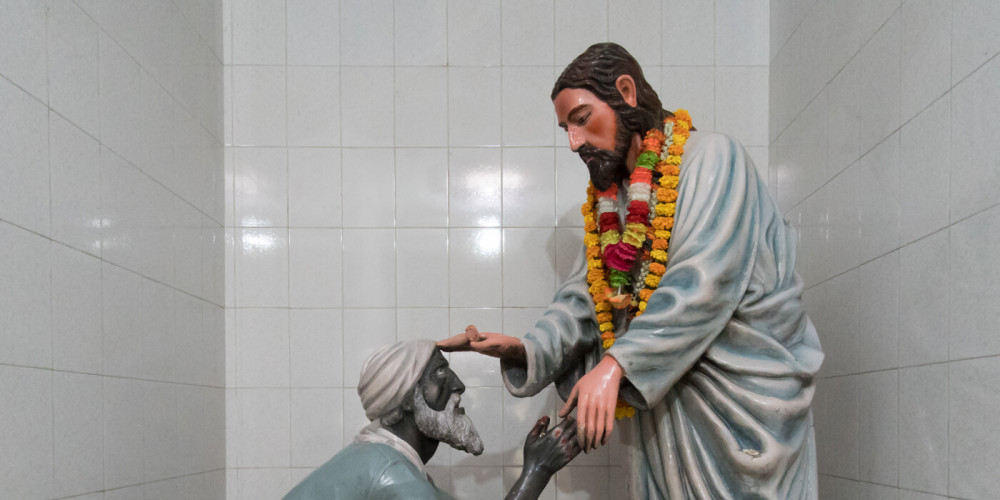KIT Blog
Being a follower of Jesus in a time of fear
-
 Admin
Admin
- Mar 19, 2020
- Uncategorized
Introduction
Thank you for being a supporter of people affected by leprosy. We know you may very well be concerned about the current situation. We’ve been through bushfires, floods, and now are wrestling with the implications of what COVID-19 will mean for Australia, and globally. Your support for people affected by leprosy has always encouraged us, and strengthened us in our faith. We have been praying for our supporters in this time. We also wanted to offer you this short devotional series, with the hope it will provide encouragement to you during this time.
We hope it provides some reflections on some of the concerns you may be facing.
- Is God really in control?
- How do I find peace in this difficult situation?
- What’s my duty as a follower of Jesus in a time like this?
We are thankful for your love and care for people affected by leprosy. On behalf of the Board and staff of The Leprosy Mission Australia please know you are in our prayers, and in our thoughts at this time.
Tim Collison, on behalf of The Leprosy Mission Australia Team.
P.S – Please feel free to share this, or copy parts of it. You can also download it as a PDF.
1: The Name of God
Passage: Exodus 3:1-14
This passage finds Moses in reduced circumstances. He was a prince; now he is a shepherd. He was a ruler, now he herds sheep. But God uses those circumstances to draw Moses to himself. Being a shepherd meant he was alone. Being a shepherd meant he knew the value of fire on cold nights. God finds Moses in difficult circumstances and speaks to him.
This is a rich passage, but three particular messages stand out. “I have seen the misery of my people” (v 7). “You will worship God on this mountain” (v 12). “God said to Moses ‘I AM WHO I AM’” (v 14). We can know three things about God from this:
- He sees and knows what his people and the world are going through. He is not absent. He hears our prayers (v 7). He also knows of your present needs. He is also aware of the situation for people affected by leprosy.
- God has a plan to see us through this (v 12). Even before Moses arrived in Egypt, God was telling him the end result. Moses would be back where he was. But he would not be alone. He would be accompanied by all God’s people. God has a plan for you, those close to you, and for people affected by leprosy.
- God has not left us alone, and will be with us (v 14). This is what “I AM WHO I AM” means: ‘being creator and sustainer of all that exists and thus the God of both creation and history, all that is and all that is happening – a God active and present in historical affairs” (Stuart, Exodus, 2006)
Reflection
Take a moment to write down some things you know about the goodness of God in past years. Be thankful.
Prayer (Borrowed from an Australian Prayer Book, Friday Evening Prayers)
Heavenly Father, In darkness and in light, in trouble and in joy, help us to trust your love, to serve your purpose, and to praise your holy Name; through Jesus Christ our Lord. Amen
2: Children of God
Passage: Romans 8:14-17; John 15:9-17 & Col 1:22
These passages say remarkable things about our circumstances in relation to “I AM WHO I AM”. The one who is “God…of all that is and all that is happening” considers us his children. Co heirs with his son, Jesus.
Many years ago now, I was driving, and crashed into a wall. It was entirely my fault. My first thought after crashing, was “How can I ring my Dad and tell him?” I was scared of his response. But what actually happened? He was nothing but compassionate on the phone. When he arrived at the scene of the accident the first thing he did was hug me. Fathers love their children. In a time of difficulty God treats you as his beloved child.
The relationship God has given us is with himself. He has adopted us. Paul is speaking here of a Roman custom, where children where frequently adopted. They then had all the privileges of the family they were in. Paul talks in Colossians about us being “transferred from the kingdom of darkness into the kingdom of his dear son”. We now have all the privileges of that.
As a result – when God looks at us he sees as “holy, without blemish and free from accusation”.
You may feel otherwise. You may feel stressed. You may be worried. You may feel you are unprepared. But God calls you his child. And when he looks at you, he does not look at you with accusation.
Reflection
Did you know singing aloud can have very positive mental health benefits? Pull out a hymnbook and sing a favourite hymn. Or go to youtube and find a beloved favourite. And then sing along aloud! Perhaps you could ring a friend and sing together? Suggested songs: “And can it be that I should gain?” by Charles Wesley, “Made Alive” by Citizens.
Prayer
Jesus, thank you that we are alive in you. That because of you God sees us as holy, without blemish and free from accusation. Help us understand what this really means. Amen
3: Where is God?
Passage: 2 Corinthians 1:3-11, Psalm 88
From AD 165 to AD 180 two waves of a plague swept across the Roman Empire. In some areas nearly a third of the population were killed. Roman deities were understood to be capricious, and difficult to please. But during this time people still turned to them. But Christianity also grew during this time period. “Christians cared for the sick and offered a spiritual model whereby plagues were not the work of an angry and capricious deities but the product of a broken Creation in revolt against a loving God” (Yeomans, Biblical Archaeology Review, 2017 & Stone, Foreign Policy, 2020).
This story, and the passage offer some helpful thoughts on where God is when suffering takes place. And how his people respond. The apostle Paul knew what it was to suffer. He was beaten, shipwrecked, stoned and rejected. But in this passage he is clear God is the one who delivered him. And he encourages them to find comfort in that. And to learn patient endurance in the suffering. What we see from Scripture is that suffering is real and will happen, but God is also present. And as Christians, like Paul, we can be comforted in that.
This doesn’t mean we need to walk around in some false sense of bliss. Psalm 88 shows us how vulnerable we can be with God when we are fearful and worried. There are two useful points we can take, especially from verse 3. Paul still praises God – regardless of the suffering he has endured. And he reminds us that as we are comforted, so we can comfort other people.
Reflection
Here are some verses to pray through when you are worried or in a crisis:
- John 9:3: That God’s glory would be displayed through this crisis
- 2 Cor 1:8-9: To depend more on God
- 2 Cor 4:10-11: To make the life of Jesus more evident to the world
- 2 Cor 12:9: To experience Christ is enough
Nancy Guthrie has some really wise words on turning suffering into ministry. She says “Rather than wanting the church to be to you what you need, be what you need to the church. The people who have the deepest hurts in your church are often the ones who are best equipped to deal with it.” If you are fearful and worried about what is taking place who could you comfort? What resource has been helpful to you?
Prayer
Father, who sustains us when all feels lost. Comfort us by your presence, and help us to also comfort those around us. Let us be a light, hope and grace to those around us. Amen
4: Our Duty
Passage: Matthew 25:31-40 & Romans 15:1 & 2
So far we have seen we are children of “I AM WHO I AM”, who is the God of comfort, who will strengthen us. What then is our duty as children of the king?
There is a long history of followers of Jesus caring for those who are sick during times of plague. In 1527 plague struck the theologian Martin Luther’s town of Wittenberg. Luther stayed to care for those who were sick, and produced a short pamphlet on a Christian’s duty in time of sickness. It is a little old fashioned but has three solid points.
- Practice good hygiene and medicine. He writes “Use medicine…avoid places where [your] presence is not needed in order not to become contaminated and thus perchance infect…others, and so cause their death as a result of my negligence.” By obeying our government’s current rules in this situation – You are loving like Jesus! Wow! Wash your hands. Socially distance yourself. If exposed don’t infect others.
- Satan will seek to use what is happening to cause fear and panic. “He is such a bitter, knavish devil that he…also takes delight in making us deathly afraid, worried and apprehensive.” Of course it is not wrong to feel those things. Luther suggest one very practical way of dealing with this fear:
- “Get away you devil, with your terrors! Just because you hate it, I’ll spite you by going the more quickly to help my sick neighbour…I know helping my neighbour is a deed well pleasing to God…If you can terrorize, Christ can strengthen me. If you can kill, Christ can give life.” Luther also writes about if we are not willing to help “the least of these” we are not willing to help Jesus. He caveats this by reminding us of Romans 1 – that if you do not feel you can help, you are not sinning. Do what Christ gives you strength to do – And helping someone else will strengthen and bring comfort to you.
Reflect
If you are interested you can read the whole pamphlet here: https://tryingsmall.files.wordpress.com/2014/08/luther-on-plague.pdf
Did you know spending 10 -15 minutes thinking about someone else, and how you can bless them can help relieve your own fears? What is a practical thing you could do to care for your neighbour (both geographically and metaphorically)? Listening to the advice our government is giving us. There are things you can do even if you can’t visit them: Pray for them, ring them, write them an encouraging card. All those can be done without needing to come in contact. If you can, you can offer to help with grocery shopping – or maybe even share the a roll of toilet paper!
Prayer (Borrowed from Luther)
May Christ our Lord preserve us all in pure faith and fervent love, unspotted and pure until his day. Amen
5: Peace
Passage: John 14:23-27
So. You’ve been spending time with Jesus. You’ve read the passages. Maybe even done some of the reflective activities. But you still don’t feel at peace. And the peace of Jesus? That seems far away to you. It is okay to feel this way. But I’d like to suggest this does not mean you are being unfaithful, or that Jesus is not with you.
Sometimes when on a plane I will notice a nervous flier. Nervous fliers don’t feel safe flying. They are often uncomfortable during the flight. But they still got on the plane. They still arrived at their destination.
If you don’t feel completely peaceful, you may feel like you are not trusting in Jesus. Let me encourage you. If you are spending time in fellowship with God. If you are praying. If you are reading God’s word. If you are loving your neighbour in whatever way you can. You are being faithful.
Like the nervous flier, you are trusting in God, by getting on the plane. It might not always feel safe. It might not be comfortable all the way. But you are on the plane. You are trusting God. And that is how we work towards being in the peace of God– even if our feelings may not match up to it.
We practice the ‘holy actions’ of fellowship (where possible) with other believers. We fellowship with God. We pray. We read. Those holy actions are the ‘getting on a plane’. And as we practice those actions, we are being faithful. Even if it does not feel that way.
Reflect
Read Psalm 91. Read it again. Choose a particular verse which stands out to you. Write it down. Memorise it.
Prayer
Father, thank you for sending your Holy Spirit to point me to Jesus. Where I am weak can you please be strong? Where I am fearful can you bring peace? Amen












